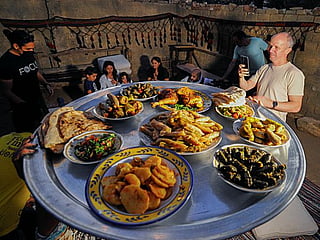Jehan Sadat, widow of ex-Egypt president Anwar Sadat, dies
She will be buried after a military funeral on Friday

Cairo: Jehan Sadat, widow of former Egyptian President Anwar Sadat, the first Arab leader to make peace with Israel, died in Egypt on Friday. She was 87.
In recent weeks, the Egyptian press reported that Sadat had been hospitalized and was battling cancer. Last year, she received medical treatment in the United States but shortly after she returned home as her condition had deteriorated, her family told local papers. No further details about her illness were made available.
On Friday, President Abdel Fattah Al Sisi’s office said she had been a role model for Egyptian women, and granted her a national award posthumously. They also announced the naming of a key highway in Cairo after her. She will be buried after a military funeral on Friday.
In August 1933, Jehan Safwat Raouf was born in Cairo to an Egyptian middle-class father and a British mother. In 1949, at age 15, she married Anwar Sadat, a military officer at the time who later served as Egypt’s president from 1970 until his assassination by Islamic extremists in 1981. It was said that initially, her parents had opposed her marrying a man 15 years her senior. The couple had four children: daughters Noha, Gihan, Lobna and a son, Gamal.
Sadat consistently defended her husband’s decision to sign a peace agreement with Israel in 1979 after nearly three decades of war, a move that was controversial domestically and regionally.
After his assassination, she largely withdrew from public life. But in recent years, she emerged as a supporter of Al Sisi and his government, after the country’s 2011 popular uprising forced her husband’s successor, Hosni Mubarak, to resign.
During her husband’s tenure, Sadat established herself as a staunch advocate of women’s rights by pushing for a set of laws that granted women the right to alimony and custody of children in the case of divorce. She also made headlines with her volunteer work and charitable activities. Her high visibility in the 1970s drew criticism from observers who accused her of exploiting her husband’s position to gain political leverage for herself.
She also presided over several national relief agencies including the Egyptian Red Crescent, the country’s blood bank and the Egyptian Society for Cancer Patients. During Egypt’s 1973 war with Israel, photographs of her visiting the wounded appeared on most of the country’s newspapers’ front pages.
Her public visibility and political influence as Egypt’s first lady marked a complete departure from her predecessor Tahia Abdel Nasser, who had kept a low-profile during the rule of her husband Gamal Abdel Nasser.
In 1972, Sadat established the Wafa’ Wal Amal, the Faith and Hope Society in Arabic, which now operates a fully integrated city for handicapped war veterans and civilians. In 1997, she created an endowment to establish The Anwar Sadat Chair for Peace and Development at the University of Maryland in memory of her husband.
On the chair’s website, she is quoted as saying: “I never again want to see the face of a starving child or hear the weeping of a mother who has lost her son to war. Peace, this is what my husband gave his life for, and I want the world to know that he did not die in vain. Peace, this is what will make me very happy.”
Her husband was assassinated October 6, 1981 during a military parade in Cairo. Mubarak, who was seated next to him, escaped with a minor hand injury as gunmen sprayed the reviewing stand with bullets. Days later, Mubarak was sworn in as president.
In 1977, Sadat graduated with an BA in Arabic literature from Cairo University. In 1986, she completed her PhD in comparative literature at the same university.
She authored two books: her autobiography ‘A Woman of Egypt’ and ‘My Hope for Peace’, about the Arab-Israeli conflict and the rise of extremism. She also served as a visiting instructor at several American universities including the University of South Carolina, Radford University and the University of Maryland.
Sign up for the Daily Briefing
Get the latest news and updates straight to your inbox









